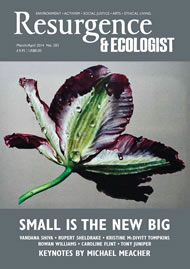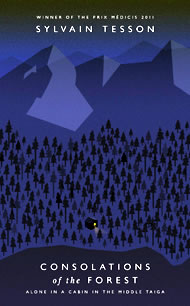Slowly, the true scale of Sylvain Tesson’s undertaking emerges: daytime winter temperatures of -27°F (that’s -33°C), Arctic 75-mile-an-hour winds, no access roads, and his nearest neighbour five hours’ march away. The sheer remoteness dawns on you – Lake Baikal, in the midst of the taiga, the vast forest of Siberia, is 5,000km east of Moscow and 4,000km west of Vladivostok. It’s 8,000 km (5,000 miles) from Paris, Tesson’s home. During the Russian Civil War, an army was forced to retreat across its icebound surface and thousands died.
Is choosing to live there, alone, from February to July, some kind of extreme sport, then? Is it a trial of masculinity? Or is it simply a stunt – the latest career move for a travel writer, who has previously followed the path of Russian prisoners escaping from the gulags of Siberia and crossed the Himalayas on foot?
“Is it a game?” Tesson asks, or is it a quest? Not quite either. He calls it ‘A Sidestep’, a journey in search of the inner life, and one that succeeded. “In the depths of the taiga,” he says, “I changed myself completely.”
It was the (almost unimaginable) purity of the solitude that made that change. “The presence of others makes the world fade away,” he says, as his companions leave him alone for the first time. “Silence is this reconquest of the enjoyment of things.”
Enjoyment of the changing light, watched through long hours of stillness; delight in the birds that “tap at the window every morning”, knowing he is going to feed them; pleasure in the slow process of starting really to see the world. “The mountains”, he realises, “have been something I’ve learned to climb, descend, navigate and survey. I have not yet ever looked at them.”
This art of contemplation, as he calls it, restores value to ordinary tasks: “Reading, drawing water, cutting wood, writing, pouring tea: such things become liturgies.” Tesson takes with him books about the hermits of early Christianity, who went into the desert to find the silence of God. He reads Thoreau too, as another model for his escape from the frenzied emptiness of modern consumerism. But thinking of such precedents doesn’t make him pious or grandiose.
Douglas Christie’s impressive study, The Blue Sapphire of the Mind: Notes for a Contemplative Ecology also suggests that the ancient Desert Fathers and their contemplative practice could provide a pattern for environmentalists now.
Sara Maitland too has written strikingly about life as a hermit in her Book of Silence. But Tesson, I suspect, would find both of them too earnest. On the long winter nights, he reads Casanova’s memoirs, smokes expensive cigars and drinks heroic quantities of vodka. He never pretends that he isn’t, from one point of view, just lazing about.
And so, thankfully, his life is not written up as an example. His loneliness and how he countered it (sometimes through manic hiking, sometimes by simply drinking) come across without exaggeration, melodrama or complaint. He remains admirably uncertain about what he’s doing and about the way forward for us all.
Does withdrawal into Nature really provide a cure for the ills of civilisation? Or is it elitist? Does it provide solace for the privileged and leave the world economy where it was? Tesson raises these questions abruptly and candidly, and not least because he knows that solitude is in fact becoming less possible by the day, as the human population grows, and with it the relentless demand for materials (for the timber of taiga).
Yet, amidst the scepticism and the self-doubt, Tesson’s time ‘away’ gives rise to the most remarkable pieces of writing, beautifully translated. His descriptions of his moments of communion (there’s no other word) with Nature are wonderful; alongside them, he presents insights that radically and subtly challenge our everyday, urban lives – lives that appear so disconnected from existence in a log cabin and yet cry out for the credo Tesson finds there: “Do not react … never let your buttons be pushed … never give up”.







